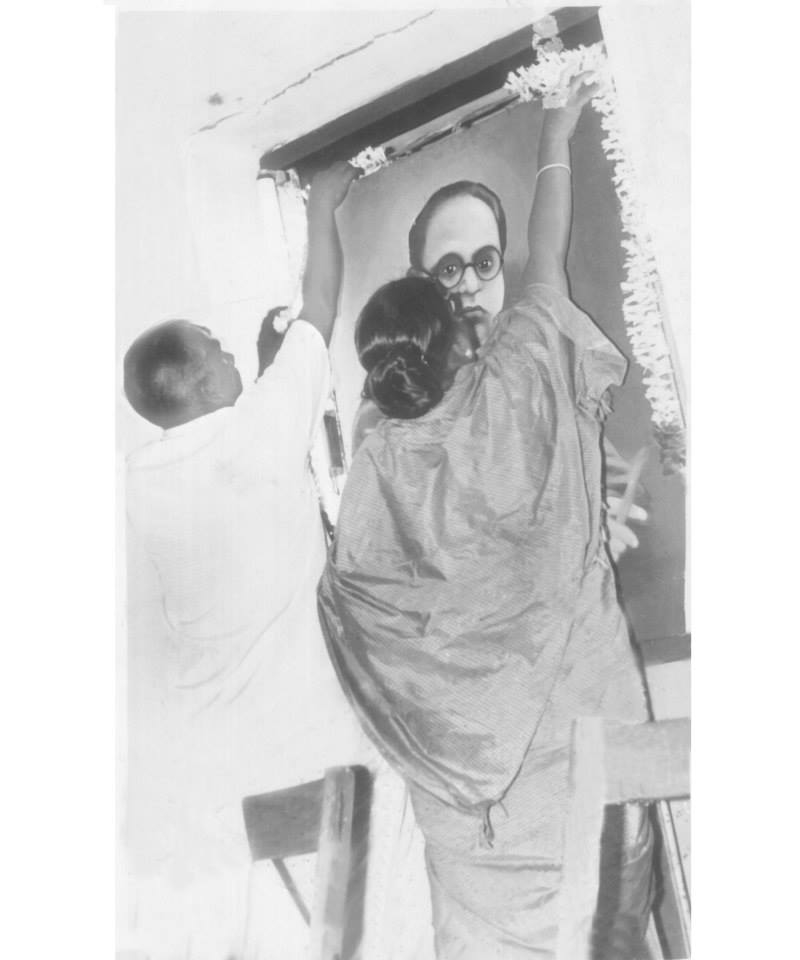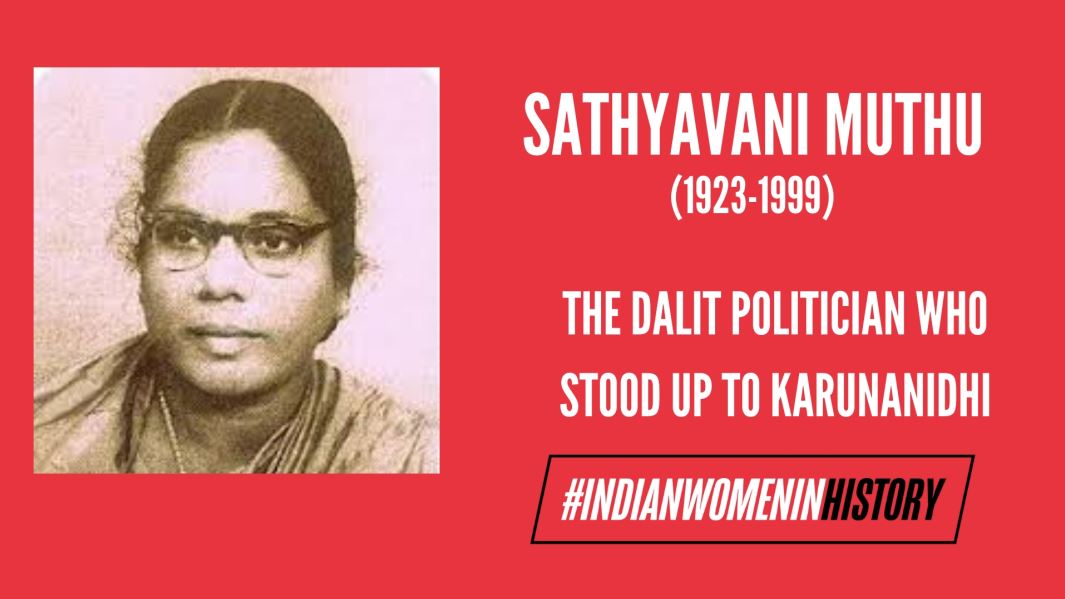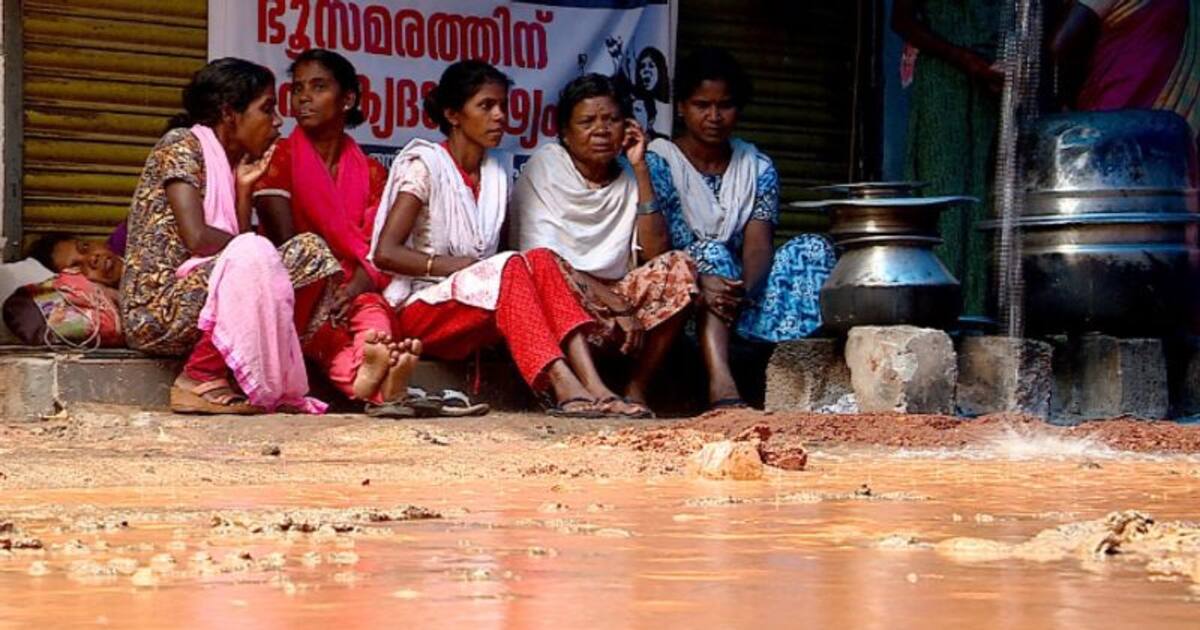History depends on who is writing it. For every documented person or event, there are hundreds of others whose stories have been invisibilised, overwritten or deliberately left out. One such woman is Dr Sathyavani Muthu (1923-1999), a major contributor to Dravidian and the Ambedkarite movements.
It is recorded that Sathyavani was exposed to the cruelties of Brahminism from a young age. Her father, a part of the Justice Party, the South Indian Buddhist association and Periyar’s Self Respect Movement, was instrumental in inspiring her to speak up against caste. Growing up, she became involved in the Self Respect Movement and even shared the stage with Periyar himself in some conferences. At only twenty, she was appointed as the head of the Scheduled Caste Federation’s Women’s Wing in Chennai. Her cover story in the magazine Kudiarasu named Hindian Ragasiyam (Hindi’s Secret) was one of the very first written in opposition to Hindi in the subcontinent.
Also read: Who Were The Women of The Self Respect Movement? | #DalitHistoryMonth
Dr Sathyavani Muthu, later on, grew up to become an influential Indian politician and Dalit woman leader. A three-time MLA and MP, Dr Muthu was one of the earliest Dalit leaders of the Dravida Munnetra Kazhagam (DMK) party and was the Harijan Welfare Minister till 1974. This makes her the first among the two non-Congress Dravidian leaders who got to serve as a Cabinet Minister at Central Government. She was a prominent member of the DMK since its inception in 1949 and a minister in the party from 1967 to 1974, till she quit.
Her cover story in the magazine Kudiarasu named Hindian Ragasiyam (Hindi’s Secret) was one of the very first written in opposition to Hindi in the subcontinent.
She led the DMK’s protests against Kula Kalvi Thittam in 1954 and got arrested for the same. She gained popularity both within and outside the party in the 1950s and she was made propaganda secretary in 1958. (A Raja currently holds this position). Dr Muthu also served as the editor of the Magazine, Annai (Mother). In 1957, she successfully contested state elections for the first time as an independent candidate from Perambur constituency. While meeting with international leaders like Pope Paul and Queen Elizabeth, she brought up issues of caste and patriarchy.
As a part of M Karunanidhi’s cabinet in 1974, she worked towards establishing a law college named after Ambedkar, following up on a long-standing demand of the Dalit community. The government mockingly cited lack of funds and asked the Dalits to raise half the amount. This did not deter Dr Muthu, and she proceeded to do just that. Her speech at an SC/ST association meeting against the Family Planning Scheme got her removed from the cabinet. It is said that her phone and water connection, security was withdrawn immediately after the controversial speech where she claimed the government scheme were targetting the poor and marginalised.
DMK has been frequently accused of being non-committed to their own vocal anti-caste cause. The party has been dominated by upper-caste non-Brahmins. Former Chief Minister of Tamil Nadu, M. Karunanidhi was the President of the party during Dr Muthu’s time. According to retired Professor of Tamil at Manonmaniam Sundaranar University, Tho Paramasivan, “Karunanidhi is wholly responsible for caste issues in this state.” Dr Muthu quit the DMK citing prejudicial behaviour by M Karunanidhi and went on to form her own party in 1974.

She left averring that the DMK had not been serious in supporting the cause of the Harijans since former CM Annadurai’s death, and in particular, claimed that Karunanidhi had been prejudiced against Harijans. Even within the DMK, there had been discrimination against Harijan members of the party despite its avowed opposition to caste. Government officials had shown themselves to be persistently obstructive in the implementation of Harijan welfare measures. Commenting on Sathyavani Muthu’s revolt, a 1974 Times of India report opined that Muthu’s exit would not cost the DMK much as the Harijan community was never a significant factor for the party.
We’ll form a new party, sit on the opposition benches, and fight for the rights of the scheduled castes. We will not let them be exploited and humiliated endlessly.”
Dr Muthu did not depart alone; she took with her several other DMK legislators and promptly set up a new party, the Thazhthapattor Munnetra Kazhagam or Progressive Federation of the Oppressed. “The time has come,” she declared, “to form a new party to fight for the rights of the Harijans. After Dr Ambedkhar, nobody has taken up the cudgels in real earnest. …. We’ll form a new party, sit on the opposition benches, and fight for the rights of the scheduled castes. We will not let them be exploited and humiliated endlessly.”
Her new party was quite small, in size and tenure, and her allegations have only recently been analysed up by The Wire. However, the act of quitting her position at a well-established political group like the DMK makes her one of the most significant anti-caste leaders to have emerged from Tamil Nadu. Her short-lived party was eventually merged with Anna Dravida Munnetra Kazhagam (ADMK) in 1977 when ADMK came to power. Dr Muthu joined the legislative council in the state. She was later elected to the Rajya Sabha and became the union minister for social welfare in 1978. When the Kizhvenmani massacre took place in December of 1968, she rushed to the village to support the victims. She arranged for the village to be adopted by the government and built houses and a school.
After almost 6 decades in politics, Dr Sathyavani Muthu stayed true to her Self-Respect principles despite the movement taking several forms and was called the Determined Self Respect Warrior by Periyar. For all her commendable work, there is little to no information available about her within mainstream media circles, especially beyond Tamil Nadu. Sathyavani Muthu Nagar is a residential neighbourhood named after her in Chennai.
Also read: Panels, Politics, and Penn (Women) In The Land Of Tamil Nadu
To learn more about her, she penned her struggles in a book titled My Agitation which was first released in 1982 by The Justice Press in Madras. Bhavani Ilavenil also wrote about the struggles of Sathyavani Muthu and released a book in 2018. The book is titled “Thaltapatta Makkaluku Kalingnar M. Karunanidhi Seydha Dhroham – Sathyavani Muthu Varalar” (How Karunanidhi betrayed Dalits – Dr.Sathyavani Muthu’s Struggles).
References
- Veethi
- The Wire
- Medium: Dalit History Month
- FirstPost
- Forrester, Duncan. “Factions and filmstars: Tamil Nadu politics since 1971.” Asian Survey 16.3 (1976): 283-296. JSTOR
- Manikandan, C., and Andrew Wyatt. “Elite formation within a political party: The case of the Dravida Munnetra Kazhagam.” Commonwealth & Comparative Politics 52.1 (2014): 32-54. Taylor and Francis





Kizhvenmani massacre happened in 1968 not in 1978